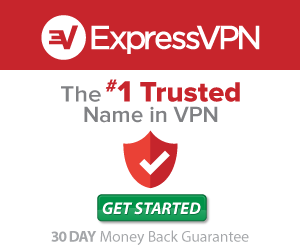Using a VPN for Travel
The internet has completely changed the way we travel. We book our flights online, find our lodging on Airbnb, and get directions from Google Maps. The world is a big place to explore, but as we share our stories, photos and experiences online, it doesn’t always feel that way. With the exception of airport security, the internet has made everything about travel easier, faster, and more accessible. But of course it has also created risks and obstacles that never could have existed without it. The security of our personal information is at greater risk as we travel, and censorship and surveillance are more likely to enter your daily life when you are abroad. That’s why we always use a virtual private network (VPN) while we travel. Specifically, we’ve been using ExpressVPN for over a year of full time travel. Here’s our review.
By the way, this post contains affiliate links. That means that if you click on one of those links and then make a purchase, we will receive a small commission at no extra cost to you. These small payments go a long way toward helping us reach our goal of totally supporting our travels through this blog. If you’d like to read more about these efforts, check out our monthly column, Operation Digital Nomad. Of course we’d only recommend products and service that we love and use ourselves, and ExpressVPN has been a winner for us.
What is a VPN?
This is a travel blog, not a tech blog, but I’ll do my best to describe how VPNs work and what they do.
When you use your modem to browse the web, do your banking or send e-mail, your computer is requesting information from a server somewhere, and that server is sending information back to your computer. In order to do this, both your modem and the server have to attach your IP address to that information so that it knows where to go. The IP address and other data can give anyone who might intercept that information - possibly hackers with access to your connection, possibly the government of the country you are in, and definitely your internet service provider (ISP) - information about your location and what websites you are accessing, along with personal data and passwords you might be sending back and forth.
A VPN connects you to another server before it connects you to that server you were trying to communicate with, effectively creating a safe tunnel for information to pass through. The result is that the server that you are accessing will see your IP address as that of the VPN’s server instead of your own.
If you would like a more detailed description of how a VPN works and of different types of VPNs, you can check out this Wikipedia description of VPN, but I’ll warn you that it is full of acronyms. Really, you don’t need to know exactly how a VPN works behind the scenes to understand the benefits we’re about to dive into.
What are the Security Benefits of a VPN?
Encryption
When you use a VPN, every piece of information sent and received is automatically encrypted. This means that if someone were somehow able to get ahold of it, they wouldn’t be able to read it anyway. Some communications are already encrypted by certain websites and services, but not all of them. Either way, an extra layer of defense is really important.
Encryption becomes especially important if you are using public wifi, say at a cafe, or an airport. When you are traveling, you are going to need to access the internet a lot, and sometimes you don’t have time to be picky. When we use public wifi, we always connect to our VPN right away so that we can feel comfortable sending personal emails or even checking our bank account or credit card without feeling compromised (we just have to make sure no one can see the screen while we’re typing).
At Hotels and Airbnbs, there is usually a password on the wifi, but it is usually a really bad password. Plus, anyone who has stayed there before knows it anyway. It’s a little more secure than the local coffee house, but we use a VPN anyway.
TIP: Some phones have a battery saving feature that turns off certain apps when the phone falls asleep. If your phone has this “feature,” make sure you turn it off for your VPN, or you will go back to an unsecured connection ever time you put your phone down.
Anonymity and Location Independence
Because a VPN “fakes” your IP address, it means that the server you are reaching out to doesn’t know where you actually are. Say you are trying to connect to Google’s server. If you are using a VPN and that VPN’s server is in New York City, then Google will think that you are in New York City. And if the VPN service has servers in multiple locations, you can appear to be in whichever location you think will be most useful.
Some online services might only want their content available to people within the borders of their own country. If you use a VPN server in that country, you will have access. Other countries might block content that is taboo in their culture. If you are inside that country and want to access the whole internet, you just need to find a server in a more open society.
Some companies also offer different prices to customers in different countries, even when the product or service they offer is the same. Other websites serve different results to people in different countries depending on what they think the demographic wants or needs. By choosing where you “are,” you can effectively travel in a new way, only instead of sharing the real world experience of the people in your “destination,” you are sharing their online experience. The possibilities are nearly endless.
Using a VPN in China
We have been in China for quite a while now, and there are a number of reasons why we recommend a VPN to anyone who is visiting, especially for an extended period of time. In addition to the security reasons listed above, China has put up a series of online roadblocks that make it inconvenient for foreigners (and locals) to access the full glory of the internet.
The Great Firewall
You’ve heard of the Great Wall of China, but there is another barrier that is harder to see. China is notoriously controlling of the internet within their borders, and many sensitive things that they can’t censor are simply blocked. They also block a number of websites and services that aren’t controversial on their face, but which might lead indirectly to information or transactions that are frowned upon.
Sometimes the Great Firewall is about censorship, and other times it’s about protecting Chinese companies from foreign competition. Whatever the reason, it’s a pain in the neck for travelers. If you want to get around it, your going to need a VPN.
TIP: If you are going to China with an Apple device, make sure you download your VPN app before you get there because Apple has agreed to stop putting VPN apps in the Chinese version of the App Store.
Some Services and Websites Blocked in China
This list is not complete, it’s just some of our favorite sites that we use a VPN for.
- Youtube
- Gmail
- Google Hangouts
- Google Maps
- Google Docs and Google Sheets
- Everything Else Owned by Google!
A few other websites that we use are in accessible from China without a VPN because the websites are blocking Chinese IP addresses for security reasons. On the other hand, there are a number of Chinese websites that you can’t access with a VPN because they are only available to Chines IP addresses. An example of this would be the popular Chinese messaging app WeChat.
What are the Downsides of Using a VPN?
Slower Responses
Because you are routing your information request to a third party before it is sent to the website you are looking for, the response time can be a little slower. This makes intuitive sense. Though information travels quickly, the world is a pretty big place, and even bits traveling at nearly the speed of light can take a little while to arrive if there are enough of them and they are going from London to Boston with a layover in Hong Kong. We always try to use a VPN server location that is either very close to us, very close to the server we are trying to make contact with, or somewhere in between us. The worst case scenario is when the information has to travel half way across the world and then come back to another server that was close to you to begin with (then make the whole trip in reverse to deliver the information you requested).
Unintended Miscommunications
Because some websites look at your IP address before responding to your request, their attempts to personalize your experience sometimes backfire. For example when we used a French VPN server while in England, we sometimes got results in French. Websites that do this usually have a little flag icon in the upper right hand corner of the screen that will allow you to change the language pretty easily, but it’s just one of those things. You can also just make sure you pick a server in a country that speaks your preferred language.
Switching it on and Off
Because WeChat is huge in China, it is often the best way to communicate with local business and individuals that we need to talk to. Airbnb hosts use it, our neighbors use it, and even the street vendors at the local market accept WeChat payments for a bag of carrots. Sometimes, when one device is charging, Dannie and I find ourselves sharing a phone or tablet. If she is exchanging WeChat messages and I am exchanging emails, we have to switch the VPN on and off constantly and it is insanely annoying. Luckily our daughter demands a lot of attention so Dannie and I are seldom both trying to work at the same time.
ExpressVPN
We signed up for ExpressVPN a few months before we left on our big adventure, and we have now been using it for the better part of two years. I’d love for this to be one of those reviews where we compare it to a bunch of other services, but we have never had an experience that required us to look into switching. Maybe that’s the best review anyone can give. At any rate, here’s how we chose ExpressVPN and what we like about it.
Choosing the Best VPN Service for Our Needs
We actually did a fair amount of research before making our decision. In addition to the usual needs of travelers, we also needed to be constantly connected because of this travel blogging habit we have. Our choice had to be reliable all the time, and fast enough for us to upload high resolution images anywhere in the world.
Price
ExpressVPN isn’t the least expensive VPN service. We are paying $99 a year for it. By comparison, there are other VPNs that are very cheap, or even free. However, ExpressVPN is taking that money and putting it to good use. They have servers all over the planet, so no matter where we travel, we won’t have to worry about slow speeds unless our wifi is bad (I’m looking at you, campgrounds in Scotland). And since dropping a hundred bucks for a year of service can feel like a big commitment, they do offer the first 30 days as a risk free trial. We made sure to do our trial period before we left on our trip.
Also, regarding those free services… Operating a VPN service isn’t free, so how can they be making money? The answer is that they are either serving you ads, or worse, they are monitoring your online activity and selling it to the highest bidder. This is a real thing. The whole point of using a VPN is that you are trying to remain anonymous and secure, so the companies that turn around and use your data like that are actually being pretty cynical in their free offering. I’d rather pay for a service I want then get the opposite of what I want for free.
Works Consistently
I think I read that ExpressVPN has good customer service, but I can’t confirm that because we’ve never had to call (I just checked, it is in fact 24/7, with pretty positive reviews). They boast near perfect up time, and whenever we’ve had an internet connection, ExpressVPN has worked. We used to operate a small business, and we’d love to promote the local Mom & Pop VPN, but because connectivity and security were a make-or-break issue for our travels, we wanted an established company with a proven track record. As one of the largest VPN services, ExpressVPN has the resources to constantly update their security, maintain their infrastructure, and evade censorship.
Network Lock
Whenever our connection drops and ExpressVPN is forced to temporarily disconnect, it automatically locks down our internet connection so that we don’t accidentally send unsecured communications while it reconnects. Luckily it alerts you with a message when this happens so you don’t sit there wondering why a page won’t load. Connecting and reconnecting usually takes a few seconds.
Privacy
ExpressVPN doesn’t log IP address or browsing activities, so they couldn’t sell your data if they wanted to. As I was saying earlier, that’s the advantage of paying for a high quality service over going for a free one. Because they have a successful business model, they have not motivation to do anything that will turn off their customers for a quick buck. They do collect anonymous data related to volume of use so that they can improve their service.
Many Location Options for Faster Connections
Because they have servers all over the planet, it’s never hard for us to find one nearby for faster connectivity. Based on where you are, you also receive recommendations about which one to connect to for the best results. We find that sometimes it still helps to try another location if the recommendation isn’t working at the moment, but overall it’s pretty accurate. Generally speaking, we are able to do video chats with my family back in the States so that my parents can say goodnight to their granddaughter on the other side of the world.
The sheer number of servers also ads a layer of confidence and reliability; if one of their servers ever did go down for some reason, there would be plenty of others to choose from.
Conclusion
After a year of travel, we can no longer imagine doing what we do without the use of a reliable VPN. We would never discourage you from doing your own research and shopping around - we’re glad that there are lots of options to keep the industry competitive and diverse - but we don’t hesitate to confirm that ExpressVPN has met and exceeded our expectations for reliability and privacy. We find that the peace of mind is worth the price, especially with the risk free trial. But regardless of which service you use, a VPN is a necessary part of a secure and truly open internet experience.







Leave a Reply